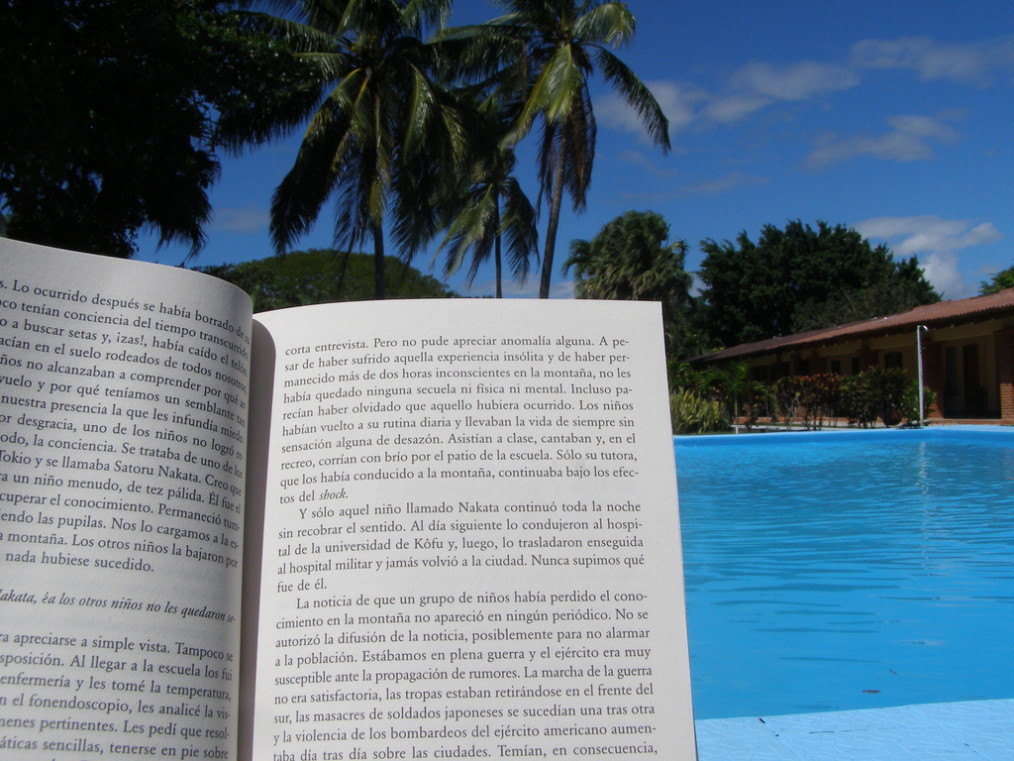
Win our summer reading picks!
Have you already picked your summer reading list, or are you still recovering from exam fatigue and haven’t had the chance to do so yet? If you haven’t, Mindwise has you covered. We’ve picked our favourite books to take on holiday and are giving all of them away to one lucky winner!
All you have to do is comment in this post by July 20th and we will send you all six books, anywhere you are in the world! The competition is open to everyone except the Mindwise editorial teams.
Maybe you can recommend your own favourite book, write about your upcoming vacation, or just comment on why you like Mindwise so much; the most important thing is to use a valid email address so we can contact you if you win! If you want to stay updated with what is new on Mindwise, subscribe to the RSS feed. In the meantime, enjoy your summer holidays!
– The Mindwise Editorial Team
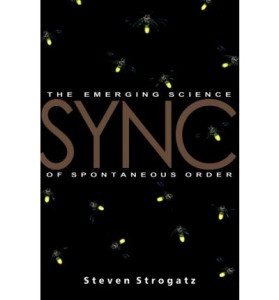 Sync: How Order Emerges from Chaos in the Universe, Nature, and Daily Life
Sync: How Order Emerges from Chaos in the Universe, Nature, and Daily Life
By Steven Strogatz
“At the heart of the universe is a steady, insistent beat: the sound of cycles in sync. It pervades nature at every scale from the nucleus to the cosmos.” Yes, this is how a book should start; this is exactly what triggers my attention! Although technically author Steven Strogatz is a mathematician, the well-written book “Sync” discusses the complexity and spontaneous order in various aspects of live. True, not all topics are related to psychology, such as the synchronized behavior of inanimate objects (Christiaan Huygens observed in 1665 that pendulum clocks swing in sync when placed close to each other), but the most fascinating parts of the book do focus on synchronized human behavior. As an example, take the case of the opening of the Millennium (steel suspension) footbridge in London in 2000. A dangerous situation occurred as hundreds of pedestrians unconsciously adjusted their steps to the bridge’s swinging, in sync. This caused the bridge to move in an erratic wavy pattern. The £18.2 million bridge was closed two days later. Do you dare to cross? Wikipedia tells me that the problem has been fixed for a while. After a closure of almost 2 years, the bridge was successfully re-opened in 2002, now minimizing the swinging, and taking people’s natural synchronous behavior into account. – Steffie van der Steen
 Schopenhauer’s Porcupines: Intimacy and Its Dilemmas – Five Stories of Psychotherapy
Schopenhauer’s Porcupines: Intimacy and Its Dilemmas – Five Stories of Psychotherapy
By Deborah Anna Luepnitz
As a postdoctoral fellow in New York, I worked intensively with people with mood and anxiety problems. The research focused on experimental medications and I learnt a lot about biological psychiatry. At the same time, however, I would attend twice-weekly conferences on psychotherapy and group and family therapy. I loved seeing psychodynamic counselling in action, and got to know some very inspiring psychoanalytically-trained clinicians. I often think back about this time, including every fall during “Introduction in Clinical Psychology.” The course book covers Freudian concepts like transference and countertransference but focuses primarily on cognitive-behavioral interventions. Yes, they are evidence-based at the group level. Nevertheless, I believe that psychodynamic counselling can also be helpful to some people, and Luepnitz provides several excellent examples. – Marije aan het Rot
 Beyond Freedom & Dignity
Beyond Freedom & Dignity
By B.F. Skinner
What causes our behavior? This is one of the fundamental questions of psychology. Behaviorist Burrhus Skinner (1904–1990), professor at Harvard University 1958–1974, emphasized that the environment’s structure of reward and punishment, generally called contingencies, determines behavior through reinforcement and extinction. I remember my student time when we were told that behaviorism was wrong because it neglected the role of internal processing. This seemed plausible back then, but in the meantime I have learned that the way history is told in textbooks is often just half the story. I thus kept in mind that I should read some original sources on behaviorism.
“behavior can be changed by changing the conditions of which it is a function” (p. 143)
Naturally the title of Skinner’s book “Beyond Freedom & Dignity” drew my attention, since I had analyzed the neuroscientific free will debate, questioning individual responsibility (remember titles like “You Are Your Brain”), in detail before. Skinner develops a theory of human malleability through cultural design, generalizing findings from his experiments on operant conditioning to society at large. He is very skeptical of notions like autonomy and freedom because of the strong force of contingencies. While he has been accused of advocating a totalitarian society, it is startling that his book sold millions of copies and spent eighteen weeks on the New York Times Best-Seller list. My own copy already was the 9th printing that appeared in March 1972.
One should keep in mind though that his broader views on social philosophy clearly go beyond his experimental work. Nevertheless, it was an inspiration for me to critically question the rules under which I am living, for example, as a young academic: Which behavior is rewarded (e.g. publishing papers), which is punished (e.g. not receiving grants), who actually enforces these contingencies, who decided them and for which aim? Skinner himself emphasized that to prevent abuse of cultural design, we must become aware of the contingencies and also control our controllers (p. 160); considering this point, his view actually seems very democratic. While the times of behaviorism have long passed, I am reminded of the book anytime I choose a “bonus” product at my local supermarket. – Stephan Schleim
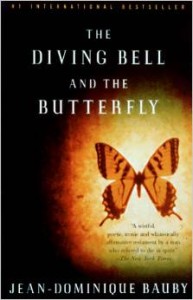 The Diving Bell and the Butterfly: A Memoir of Life in Death
The Diving Bell and the Butterfly: A Memoir of Life in Death
By Jean-Dominique Bauby
I recently read Jean-Dominique Bauby’s book entitled ‘The Diving Bell and the Butterfly: A Memoir of Life in Death’ again. In the book, Bauby describes his life after having suffered a stroke in the brain stem which left him in a locked-in syndrome. A locked-in syndrome is a rare condition in which sufferers are awake and fully conscious but unable to speak or move any body part, with the exception of the eyes (Bauby spelled his book by blinking out his thoughts via his left eye). There is a lot to like in this book but what I like most is that out of a sudden, I enjoy and value all the small details of daily life which we are so ready to take for granted. – Lara Tucha
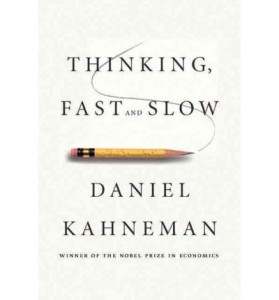 Thinking, Fast and Slow
Thinking, Fast and Slow
By Daniel Kahneman
Ask yourself or your friends when you next have the chance: “Why do highly intelligent women tend to marry men who are less intelligent than they are?” It is interesting to hear the range of answers and enjoy their creativity, but I’m willing to bet good money that the real reason doesn’t feature among them.
Daniel Kahneman won the 2002 Nobel prize in Economics for the work that he and Amos Tversky did, demonstrating that humans are not the rational decision-makers they claim to be. Now, Kahneman steps into the waters of popular-science writing with a book that is an excellent demonstration of his thinking and writing brilliance. In 38 chapters, he provides an eloquent and approachable summary of most of his career’s work, without seeking to talk down to the reader. He frames this under the unifying analogy of two thinking systems; one slow, purposeful, and effortful and one fast, automatic, and effortless. Along the way, he offers convincing insight on how people make choices and decisions, often counter to reason. There are valuable lessons to be learned, but the pills that contain these lessons are easy to swallow, if not easy to digest. – Tassos Sarampalis
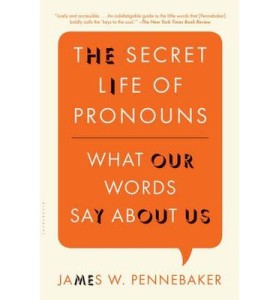 The Secret Life of Pronouns: What Our Words Say About Us
The Secret Life of Pronouns: What Our Words Say About Us
By James W. Pennebaker
In The Secret Life of Pronouns, social psychologist and language expert James Pennebaker uncovers the power of those words that seem so insignificant in our language: The pronouns. The use of I, we, me, and us are related to important everyday questions, ranging from: “How to explain the success of Presidential speeches? (compared to George W. Bush, Barack Obama uses almost half the number of I-words in his speeches)” to “How to predict the likelihood that speed dating couples will go on a second date?”
Although the book does a nice job in relating pronoun use to topics such as lie detection and suicide, I believe the value of Pennebakers book lies in explaining how analysing the use of pronouns and other function words gives insight in the ways in which people are connecting to each other, in terms of group cohesion, power relations, and love. – Namkje Koudenburg
NOTE: Image by José David Leiva, licenced under CC BY 2.0



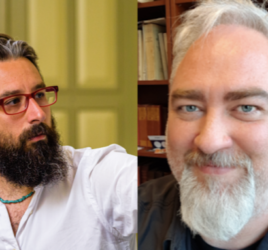

Very interesting list! Especially the one about language use and Sync seem very interesting. I already read Kahneman’s book and have recommended it to a bunch of people because it’s very accessible and doesn’t require a background in psychology.
Here are my personal recommendations:
“Bad Science” by Ben Goldacre gives an entertaining introduction to the scientific method by discussing cases in which it was violated/abused.
“A Madman Dreams of Turing Machines” by Janna Levin tells the stories of Kurt Gödel and Alan Turing who were two of the most important scientists of the previous century. It’s a fictional novel that’s based on their lives and introduces the reader to those geniuses’ ideas by telling the stories of their tragic lives and deaths. (Bonus recommendation that’s set around the same time but is much, much more detailed: Einstein: His Life and Universe by Walter Isaacson – kind of long by does an excellent job of embedded Einstein’s discoveries into the historical context and explaining the ideas behind (general) relativity and quantum mechanics.)
“The Signal and the Noise” by Nate Silver is a book about making predictions and using statistics to make sense of noisy data. It has great examples of where we made progress (e.g. weather forecasting) and where we still fail miserable (e.g. earthquake predictions) and – more importantly – what distinguishes them. It also has interesting discussions on the recent economic crises. Easy to read and very informative (and doesn’t require any mathematical/statistical background).
Have a nice summer!
Great!
I want to add a recommendation for B.F. Skinners “Walden Two”. It’s rather fictional though,but describes a too-good-to-be-true utopia based on Skinners operant conditioning. Situated in a rural American countryside, Skinner’s alter ego explores an alterantive community that only rewards social and altruistic behavior and ignores aggressive or unsocial behavior in order to extinguish it. This book probably won’t be the best book that you’ve ever read, but gives some interesting food for thought for people who are interested in the philosophical/ethical debate about what actions we are allowed to take to improve and shape our society and how far we should go with this pursuit.
Hi! I would love to get these books for my holiays this year! They seem very interesting! Is it really true?
Best,
Ilona
Oh sorry, I still have to comment on my holidays and my favourite book. So, I am going to Georgia in 1 month, really looking forward to seeing the mountains of the Caucasus and swimming in the Black Sea. And my favourite book is the Lord of the Ring, a classic one!
Very cool, I will not have any vacation this summer (pity win?!) but there is always some time for good books!
I actually really like this blog, honestly, because I miss Groningen and the way the university worked.
Currently, I am doing a PhD in Germany which I admit does come with some advantages (salary..okay…ONE reeeeally limited advantage) – but in comparison to the RUG, the uni is behind on technique (Nestor/Progress..everything that I took for granted!), student friendliness (meeting a professor to ask questions, who do you think you are?!) and, sadly, open-mindedness.
Thanks to this blog I still feel connected a bit, reminding me that university is not all bad but has a lot of options to do cool research and collaborate…plus, I am always really happy (and a bit proud and hyped) that I “know” the authors.
My favorite so far was Mr Morey’s Why APA style is nonsense to learn – It was just such a “typical” Morey-too-cool-for-school – which I forwarded instantly to my supervisor and my Bachelor students.
Thanks a lot and keep “mindwise” going. Cheers from Germany!
This is awesome!
I’ve read Daniel Kahneman’s Thinking Fast and Slow a few years back when I was on vacation in France. I had basically just gotten out of the library and the accompanying exam period and I was quite worried that more psychological literature would freak me out. Nonetheless, it was the only book I brought on the trip and I don’t regret a thing. Kahneman’s book was a more refreshing and an easier read than I had imagined and I highly recommend it to anyone!
Now for the remaining books, I haven’t read them but I would love to get the chance to bring them on my next vacation.
Cheers!
Hi Mindwise team!
I think this is a really great idea! Especially for people like me that say they are going to read a book, then do not find a good one and then end up not reading a book. The selection you posted above looks super interesting! I would be super excited to read them now that I have a summer break between my bachelors and masters!
I hope to hear from you guys soon!
Nadja
Wow what a great chance! I would really love to win those books because in the holidays I really love to relax and do nothing at all, but after a few weeks I begin to feel a little useless and I would really like to do ‘something’, but still relaxing! I think such good books are perfect in a situation like that!
I hope to hear from you!
Greetings, Esther
Help Mindwise Team!
What a wonderful idea to give away books especially when they are such interesting and meaningful!
I will spend my summer vacation in Vigo, Spain. It is a little city above portugal, close to Santiago de Compostella. It is a wonderful place, where I am going to surf and lay on the beach, the only thing missing would be some great books.
Kind regards
Michelle
What a great idea! Since I have been dying to find some good books to read for long flights and waiting at the airport, this is an amazing opportunity for me. All of these books seem extremely interesting to read and I would love to have them.
Mindwise is very unique blog that touches topics interesting for students as well as the alumni and the staff of the university. I enjoy reading it and I hope that you keep up the good work!
I am keeping my fingers crossed to receive these amazing books, but mean while I would like to wish great summer holiday for the Mindwise team as well!
For the past three years I have given my eyes a rest over the summer in order to prepare for a new year full of reading.
But now things will change! I finally have a summer holiday in which I have the time and motivation to read books other than the “DSM-5.”
Because I stopped reading for fun – I have lost track of what’s cool and what’s not in terms of books – but seeing these books does make my eyes tingle with curiosity.
Getting those books would be great – seeing that my summer will probable consist of many rainy days back in the UK…
OH! BOOKS!!!!
I have almost finished “The Master and Margarita”, by Bulgakov, very interesting and it makes you think in different ways. One word can have different meanings, and that is what makes it all exciting! ~perception!
Hmm.. maybe you will be just in time before I finish two books from Marquez that I have and one of Oliver Sacks. THEN I would have to visit the bookstore…
This summer might be the first one for me that I will not go to my homeland, Greece, due to health problems. So you won’t send them far! Just in Groningen! But who knows? Maybe I’ll take one of them eventually for a week to Kefallonia, in the end of August, if all goes well! Fingers crossed and a very very relaxed summer to all!
What a lovely idea!
At the moment i’m getting ready for my summerschool trip to Lisbon to study religion in the public sphere. I just learned it’s supposedly going to be super nice weather for the time we’ll be staying there :o.
What better way to convince myself to get back to the Netherlands than to know a bunch of books might be waiting for me on my doorstep! 🙂
Wonderful list and I would enjoy reading them all. I’ve read Khaneman’s book and it is terrific.
Great idea! Fingers crossed.
Wow, so many great comments! I cannot win the books (part of the editorial board), but just wanted to thank the readers for their support and their great book suggestions!
great idea, they all sound very interesting! would love to take some of them on holiday!
I just finished reading dr.Jard Devilles’ book “The psychology of leadership”. The book was about human management and relationships between different types of human personalities. It was a good book to read since in the fall I will begin my first year as a Psychology BSc in Groningen.
I am ferly new to psychology and finding good books about it is pretty though. I think getting these books will give me more insight into my learnings and inspire me to accomplish a Dr. degree one day.
This is so amazing! Pennebaker’s and Kahneman’s books are two of the readings on my list already! And I remember Maarten talking to us about Skinner’s book during one of his lectures.. I would love to check that one out as well 🙂
Great idea, I would love to win them! My favourite books right now are from the ‘A song of ice and fire’ series, but more books (and something other than fantasy) are always a very welcome addition during the holidays 🙂
Obviously I’d love to win these books. Who wouldn’t?
My additional suggestion would be “Leviathan Or, the Whale” by Philip Hoare. It’s a scholarly and informative, yet also remarkably passionate and intimate, account of whales and whaling throughout the ages.
great
i appreciate the chance to get prepared for rainy days
good luck everyone
Great idea!
I’d love to win those books (obviously) and to spend my summer reading them. They all sound very interesting and seem like a great addition to my bookshelf. If anyone is still looking for new reading material this summer: I’d recommend ‘Roots’ by Alex Haley. Not psychology themed but definitely one of my favourites. It is a historic novel in which the author writes about his family roots, starting in Africa and ending with his birth. Does not sound too interesting, but the writing style is really catching and it gives a great insight into the issues of different generations.
Great idea by the way, hope you all enhoy your holidays!
Wow, I would love to read these books!
(and I would love to win them even more ;))
Thanks for the opportunity of winning them.
I am currently reading (or rather working my way through) to a book by Lisa Blackman called “The Body – Key concepts”. It’s a neat and conscise summary of social theory’s conception of the – and here especially social embodiment. Blackman goes out to argue how our bodies are not separate entities, concrete physical substances, but rather connected with, created by, and lastly shaping culture. It’s a critical psychology/ queer study/feminist oriented book and a great introduction to thinking about the body, not as a machine, but an interlinked, dynamic organism.
That is a great list. Especially Khaneman’s book.
My tip for summer reading Francois Lelord: Le Voyage d’Hector ou la recherche du bonheur (Hector and the Search for Happiness).
Hector is a successful young french psychiatrist. In order to help his depressed patients, he travels around the world to find secret of happiness.
The entire Hector series is great. It’s funny and oh so cute, while it does hold a certain wisdom. If possible, I’d read it in french, as the language is pretty simple.
Commenting due to having become very intrigued by these books.
Wow, I would love to win those books. Reading them would be the perfect thing to do during my semester break.
What an impressive reading list! I am halfway through “Thinking, fast and slow” by Daniel Kahnemann right now, and it’s a really worthwile book, I would love to read your other recommendations!
There have been a lot of interesting suggestions brought forward in the comments above and I feel that I should contribute my own two cents. I have a couple of suggestions for a variety of tastes, all in hopes that one of them will win those books.
Let us begin with my personal favourite book titled “Sex, Drugs and Chocolate: The Science o Pleasure” written by Paul Martin. It a fascinating read if you have been interested in why and how we feel pleasure, what can bring us pleasure and how to best manage our desire for it.
Another excellent book is titled “Social Intelligence” by Daniel Goleman. In this book, Goleman explores the effect that our social surroundings have on us and our internal mechanisms, both the benefits and the disadvantages of them. It is an interesting read for anyone interested in sociology.
Two more interesting books for those interested in sociology, which are also relevant in our modern times, are “Propaganda” by Edward Bernays and “The Crowd: A Study of the Popular Mind” by Gustave Le Bon. If you have an interest in how crowds behave or how they can be influenced then I highly recommend picking up these books, as they are quite interesting to read.
Delving away from psychology, I highly recommend reading “1984” by George Orwell, “Brave New World” by Aldous Huxley and “Fahrenheit 451” by Ray Bradbury, what I consider the best Dystopian novels I have had the pleasure to read. An absolute must read in my opinion.
Finally, I would like to finish off with an obvious reading choice, considering its popularity as a television series. “A Song of Fire and Ice”, written by George R. R. Martin, or as it’s more commonly known as “Game of Thrones”. I recommend this to anyone who is a fan of the series and is part of those who like to know what will happen.
On a side note, if you understand French and like the famous Milgrim study there is a French documentary which tries and replicates this in a modern game show setting. the documentary is called “Le Jeu de la Mort”, which translated into English would be “the Game of Death”.
This summer I will have the best vacation ever. I will go some place with blinding white sand, blue-turquoise sea, palm trees with a hammock, beach huts, cocktails… And I don’t even have to pay for it, because the only part of me that really goes that place is my imagination. In reality I am starting post-gradual training in psychological psychotherapy. That means a lot of work, low salary and no vacation for the next years, but that’s okay – I know why I am doing all this. So, I would certainly not be able to read ll those books during my non-existent vacation (or during the imaginary one), but I guess books are patient 😉
All of them sounds very interesting! And for someone who loves to read it could be a perfect summer.
Very interesting picks! At the moment I am reading Thinking Fast and Slow, I’m borrowing it from the GMW library so if anyone gets the idea to reserve it from the library after not having won, I can’t finish it :O
I will be spending my vacation in Groningen, where else :). Well, there is a slight chance that I’ll be attending a 10 day meditation retreat in Amersfoort starting next week, I’m on a waiting list. Currently however, I am doing volunteering work at a nursing home at a department specialized in Parkinson’s disease. I was warned that older people can be quite mean, but to the contrary, everyone is very nice. It is very rewarding work, but aside from that I feel I’m learning things no psychology book can teach me.
Hot day ahead. Stay hydrated and good luck winning everyone! 😛
During the past two weeks, I discovered again how much fun it is to read regular books. After months of deadlines and exams, I never thought I could be so happy from simply sitting in the sun on my doorstep, reading Harry Potter (for the millionth time), the Fault in our Stars, or the Luminaries.
I guess that’s all I want to do during my holidays. But I’m also going to Lowlands, which will be fun as well :).
Great suggestions! 🙂
Great books ! (: Surely no matter who gets them, she/he will be one very happy reader who will learn a lot about human behavior, psychology, psychotherapy, consciousness, the power of words and many other things !
During the last few weeks I was busy working to pay for my tution fees. In less than 2 weeks I am going on one of the biggest journeys of my live. I will move out and move 650km away from home to the lovely Groningen to start my studies in psychology. Having such great books to read on my long journey would be such a pleassure to me specially to have somethign to read during the times I can relax. Since I have had some of those books on my to read list I would love to the get them as soon as possible. 🙂 I can not wait to read some of the books even if I do not get them from you and I can not wait any longer to move to the lovely Groningen!
My next journey will be the move from germany to wonderful groningen, where I will begin to study this year. Your books would be the perfect warm up for the english taught bachelor programme in psychology!! 🙂
These books sound very interesting, and I would be really happy to add them to my summer reading. 🙂
I already moved to Groningen just to be prepared for every bad scenario that might appear, before the first semester of the bachelor program psychology is going to begin. So I have time to do some meaningful stuff like reading your suggested book collection, whereby I hesitated on buying 3 of those books already. Below I briefly review one of my favourite books.
This way I mention the book “Lob des Sexismus” written by Lodovico Santana. In this literature Lodovico explains his personal view of seducing woman at nearly every place you can imagine.
The author structured his thoughts quite well and teaches his practical skills in a well-planned order.
The content itself summarises a lot of books I read before. Thereby it permits a wide spread range of issues that reflect epigenetically fixing those.
Of course it is only an advice how to behave in general, but for me this book conceptually works in its groundwork.
Since I’ve got a hard time being anxious for my Psychology studies starting in September, I would be be tremendously interested in reading these books.
Since I do not have any work to do right now I would love to win your books!
P.S.: I would recommend some of Y.D. Yaloms book if you are looking for an easy read!
Great books, would be amazing to read them all before the psychology programme 🙂
Congratulations to Tuija! Her comment was selected by our random-number generator as the winning one and the books are on the way to her house! Happy reading, Tuija 🙂
-Tassos
Congrats Tuija!
I’d love to read (and of course even more to win) these books! 🙂
Josi!
These are last year’s choices for our summer reading list. In a couple of days we’ll announce our 2015 selection (which you can also win ;))
_tassos
efficiency…